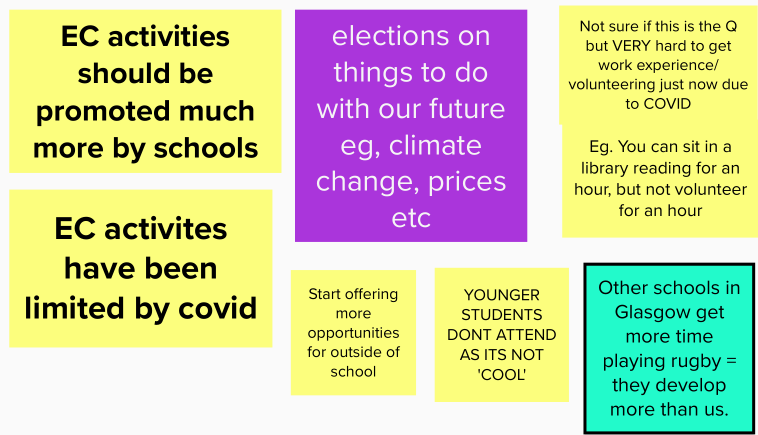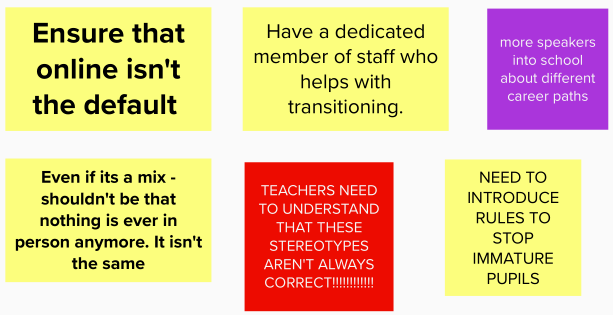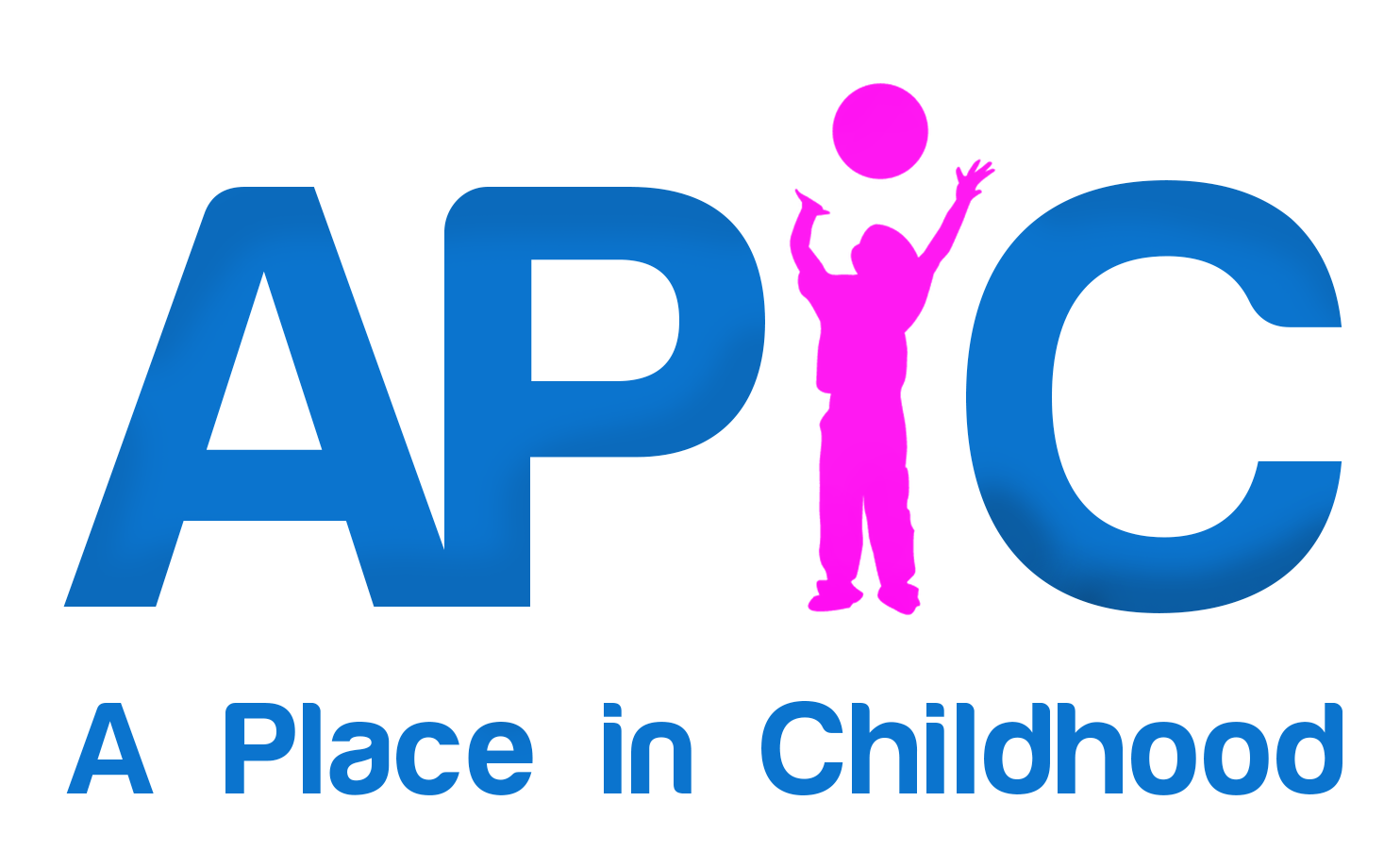In January 2022, we resumed workshops for STAGE 3 of APiC’s COVID-19 Project with Children and Young People. Supported by the Children and Young People’s Commissioner Scotland (CYPCS), #ScotYouthandCOVID3 has recalled the Young Consultants who participated in our original two stages of the project.
Lat week, we reported an overview of the findings of our last workshop with our original Young Consultants. You can read more about the project and the workshop task here. Yesterday, we reported more of their findings, regarding how young people should be fairly assessed. You can read about that here.
In this blog, we discuss what our original Young Consultants think should change about extra curricular activities and transitions between types of schooling and into the working world.
The remainder of this blog is worded in the first person, to represent their voice on the important ideas they raised.
Extra-Curricular Activities
We believe there needs to be a greater recognition, value and respect for the role and importance of extra-curricular activities for the wellbeing and full development of Scotland’s young people.
The growing workload and time pressure of school on pupils and teachers, particularly in the senior phase, is eroding our energy, motivation and commitment to pursue other interests in our free time. We therefore propose the following changes to secondary education:
- A better work / life balance. Many of us don’t have time or energy to take part in extracurricular activities, even though we would like to. For example, some of us now only have a half hour lunch break. Long school days, weighty homework, and exams means we are exhausted, and already feel we are stretched too thin. Too often, there is disruption to routines that means we get out of the habit of attending something and no one encourages us to return. Those extracurricular activities that already exist need to be better promoted, communicated and pupils encouraged to attend.
If neither we nor our teachers have the will to put into after school clubs, then they quickly fizzle, and with it, the motivation to get new ones off the ground. The mistaken assumption is that there is no interest for them anymore, when the problem may be timetabling.
- More purposeful and motivating opportunities. There can also be an absence of relevant and appealing extracurricular activities, especially for those seeking options other than sport.
Some of us only attend extra-curricular activities because we’ve been told participation will look good on our CV or university applications, not because we find them truly engaging.
We’d welcome more opportunities to gain practical work experience or learn new skills, but find it difficult to find anything appropriate. There is also the potential for schools to allow time, focus and space for extra-curricular activities within school time, for example, placemaking, community engagement, engagement with local authorities, or debate. It was suggested that elections within a school environment would be a helpful way to determine what activities get offered, and we could help set these up and facilitate them ourselves (with appropriate support).
Greater engagement and collaboration with young people on what ‘purposeful and motivating’ means could help with the development of more appealing and successful extra-curricular activities.
- Inequity in provision and quality. The cost of extra-curricular activities can also mean that many find it difficult, or impossible, to access any affordable opportunities where they live.
Some sports clubs may have clear pathways into professional play, while others don’t offer any such options. Some schools and areas offer a good range of facilities and opportunities for young people, while others have limited options.
We think the goal in delivering extra-curricular activities should be equity in provision and quality of opportunities for all young people. This should be an essential stream of Scottish education, which complements curricular learning, and might find creative ways to keep going during crises like the pandemic.

Transitions
Having just experienced the transition from primary to secondary school or secondary school to university, some of us would like to propose the following improvements:
- The aim of transition is to have a rich sense and experience of the people, setting and how it all works before we start. The transitions we have been experiencing into secondary school and into university have mostly been virtual. A proper transition, depends on opportunities to visit new settings and meet our teachers in-person wherever possible. We agree with the principles of a good induction, set out by Young Consultants from Families Outside said – we need to:
- Know the teachers / lecturers
- Know our way around
- Know what to expect
We suggest a dedicated member of staff might lead this in a secondary school, or we might buddy with older pupils/student to support transitions. Seniors would also welcome more careers talks from external speakers coming to their school, and for a much clearer understanding of pathways into employment in general.
- A more thorough induction in secondary school ‘culture’. This is particularly so following COVID-19 restrictions, where many young people in early secondary school have lacked the smooth transition and rites of passage that most experience when leaving primary school.
We need a much better introduction of social rules and norms, without which we struggle to know our place in the social order of a secondary school. This can cause cycles of misbehaviour and problems to others, such as saying inappropriate things or squaring up to seniors. We all need to be clear on the social rules, and for these to be upheld and enforced effectively and consistently!
Finally, the change in culture between one school and the next can cause problems. Something that has arisen for one of us means we want to include the following principles:
- A clear commitment to challenging stereotypes. One of our female Young Consultants has moved from a primary school where boys and girls got the same opportunities, to a secondary school where young people are told they must take part in certain sports based on gender. For instance, boys play rugby and girls do cheerleading. We feel strongly that secondary schools should be mindful not to reinforce gender, and other, stereotypes, and that options on offer should be available to all in the first instance!

We believe that incorporating all of the above, alongside those in the previous blogs in this series, will truly help to bring about a fair and motivating education system in Scotland!
What’s Next?
We will be convening workshops with one more seldom heard group over the next month, as well as reconvening our original Young Consultants to discuss our findings. If you are interested in finding out more about this project, or getting on the mailing list to receive a link to our Scotland-wide survey later in the year, please get in touch with Dr Jenny Wood at jenny.wood@aplaceinchildhood.org.
We will be posting further updates on this project as we go, so follow us on Twitter for updates. We will also be writing a report at the end of the project, to chronicle our journey to the Children and Young People’s Manifesto for Rights in Recovery.
Read about wave one and wave two of #ScotYouthandCOVID here.
